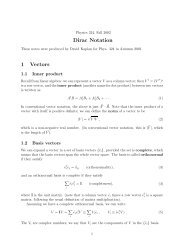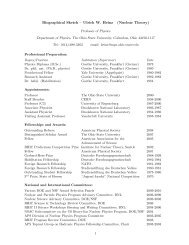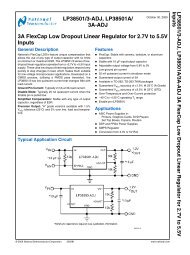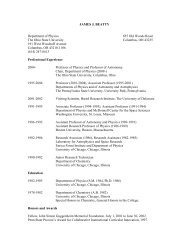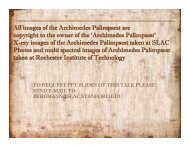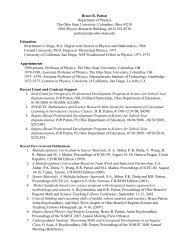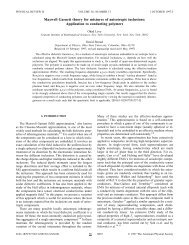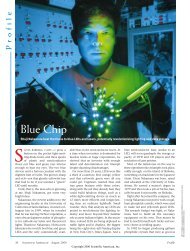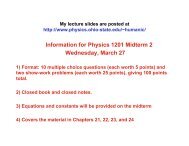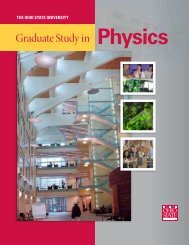Brasil Final Report - Department of Physics - The Ohio State University
Brasil Final Report - Department of Physics - The Ohio State University
Brasil Final Report - Department of Physics - The Ohio State University
Create successful ePaper yourself
Turn your PDF publications into a flip-book with our unique Google optimized e-Paper software.
54<br />
Within U.S. universities, the department is the basic instrument <strong>of</strong> change. Deans and<br />
presidents can encourage reform, but changes will not last more than the funding cycle unless a<br />
substantial minority <strong>of</strong> the faculty in the physics department really wants to change. <strong>The</strong> average<br />
lifetime <strong>of</strong> a dean in a university is three years. Faculty last much longer. We all know <strong>of</strong> instances<br />
where one superior faculty member has developed an excellent course that fades the minute he or<br />
she goes on sabbatical. Thus several faculty members need to work together to change the way<br />
undergraduate students experience physics. In addition, they need the support <strong>of</strong> other members <strong>of</strong><br />
the department. Not all faculty will want to actively work with undergraduate students, but it is<br />
essential that the time-consuming work involved in mentoring undergraduates as well as revising<br />
undergraduate courses be valued by the department as a whole.<br />
Real change in undergraduate physics must involve the entire undergraduate physics<br />
program, not just the curriculum. Revision <strong>of</strong> the introductory courses in physics is important both<br />
to improve public appreciation <strong>of</strong> physics and to satisfy the new engineering guidelines. Courses<br />
for students who will be teachers are particularly critical for the future <strong>of</strong> physics. <strong>The</strong> PER<br />
community and physicists in general have put a great deal <strong>of</strong> effort into developing several revised<br />
versions <strong>of</strong> such courses.<br />
<strong>The</strong> new introductory courses provide exciting learning experiences for students enrolled in<br />
them. However, departments cannot afford to neglect the upper division curriculum for physics<br />
majors. In addition, departments must examine the needs <strong>of</strong> those who employ their graduates,<br />
provide adequate counseling for students, mentor undergraduates in research projects, work with<br />
departments whose students enroll in the physics service courses, and actively recruit physics<br />
majors. Healthy departments generally foster social interaction among faculty and students.<br />
Revitalizing undergraduate physics clearly involves much more than new curricula and the design <strong>of</strong><br />
new introductory courses.<br />
<strong>Final</strong>ly, each undergraduate physics department is unique with a different mission, different<br />
types <strong>of</strong> students, and a different blend <strong>of</strong> faculty members. What works well at a private research<br />
university may not work at a regional university which <strong>of</strong>fers only a masters program. All<br />
departments can benefit from sharing ideas with one another, but most departments adapt good<br />
ideas to fit their local environments. Like politics, effective changes in undergraduate physics will<br />
ultimately be local.<br />
Undergraduate physics in the U.S. has just begun a process <strong>of</strong> change that will probably<br />
consume the next decade. We have much to learn from one another and from physics departments<br />
in other countries. Certainly we need to open channels <strong>of</strong> communication from one department to<br />
another and from one country to another. Good ideas turn up everywhere!<br />
We physicists work hard, and we are capable. Working together, we can achieve our goal <strong>of</strong><br />
excellent physics education for all undergraduate students.




